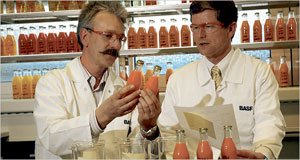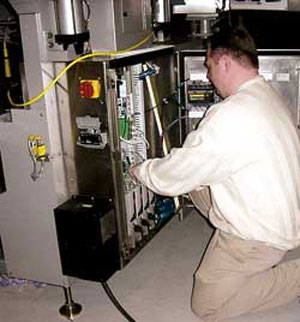Food Engineer
Tasks & duties

Food engineers may do some or all of the following:
-
design new methods of processing, packaging and preserving food
-
test equipment and processes in the laboratory, pilot factories (where products are tested) and commercial factories (where products are actually made)
-
scope, develop and design new equipment for processing factories
-
source equipment for food companies – from individual components to the whole factory
-
cost processes and equipment
-
improve existing equipment in factories
-
improve existing processes in manufacturing factories
-
fix processes that are not working properly
Skills & knowledge

Food engineers need to have:
-
knowledge of process engineering
-
knowledge of the chemical and physical properties of food products
-
knowledge of food hygiene and microbiology
-
knowledge of the interaction between food and the equipment used to process food products
-
knowledge of food processing equipment such as canning equipment, dryers, pumps and heat exchangers
-
problem-solving skills
-
planning and organisational skills
-
communication skills
-
writing skills for producing reports
Entry requirements
To become a food engineer it is preferred you have a Bachelor of Engineering in one of the following:
-
Chemical & Process
-
Materials & Process
-
Food Engineering
-
Biochemical
-
Biotechnology
-
Bioprocess Engineering
Other acceptable qualifications for food engineers are:
-
Bachelor of Technology (Food Technology)
-
Bachelor of Science (Food Science)
Secondary education
A tertiary entrance qualification is required to enter tertiary training.
To enter a Bachelor of Engineering course, you need to have studied chemistry, physics, and maths with calculus or statistics and modelling to NCEA Level 3. TradeLink website has some useful information.
Tertiary education
In New Zealand, there are 12 degrees on offer for food science, technology and engineering. Some food engineers also study biotechnology or chemical engineering.
New Zealand Institute of Food Science and Technology website - courses in food science and technology
Registration
After completing qualifications, getting appropriate work experience (usually four to five years) and completing a practical competency assessment, food engineers may apply to the Institution of Professional Engineers New Zealand (IPENZ) to become chartered professional engineers (CPEng). Registration is voluntary, but is preferred by some employers.
To maintain registration, every five years (or less) chartered engineers must show they are competent to practise, and demonstrate that they are undertaking professional development.
Useful experience
Engineering workshop or assembly experience is useful, and can be learned through tertiary training. Experience working in a team or organising people and projects is also useful.
Related courses
Food Science and Biotechnology
Laboratory Technology
Organic Chemistry
For more information, please refer to Career Services.
Document Actions
